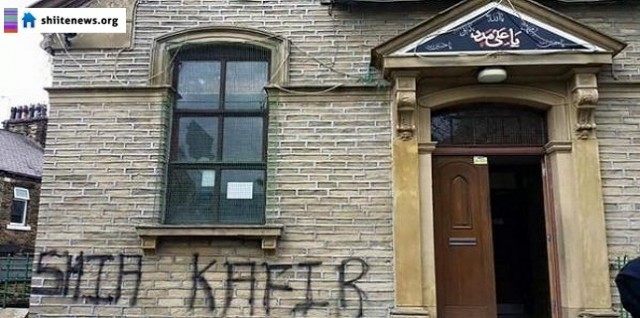Sunni vs Shiite sectarian violence has long been a defining factor of Middle Eastern conflict; as ISIS has taken hold thorough the region that conflict has waxed rather than waned. But warnings of violence between the groups have now been issued in the UK, as immigrants from the region bring their ideological baggage with them.
Back in the Middle East, July saw IS fighters in Yemen bombing two Shiite mosques, killing hundreds in an attempt to drive out Shiite groups and take over the country. And in Tikrit, Iraq, 1,700 Shiite army cadets were slaughtered by IS in a gross act of sectarian violence. Jihadists filmed the massacre, turning to the camera to say: “This is a message I address to the whole world and especially to the Rafidha dogs, I tell them we are coming.”
That message has hit home in London, where Sunni / Shiite violence has long been brewing. Sayed Ammar Nakshwani, a leading Shiite cleric has already left the UK for the United States following a protracted campaign of threats against his family by Sunni militants, The Times has reported.
It began in 2009 with his car being smashed up and the word “rafidi” daubed on it – a common Sunni insult against Shiite Muslims which refers to their rejection of Mohammed’s companions.
“They would sometimes target my house and call me and say, ‘Hey rafidi, watch your back’,” Mr Nakshwani said. “One time there was a call at midnight where they said your dad has gone out and we can see him at the supermarket. They had followed him and were watching him.”
At a Sunni-Shia “unity event” in north London, Mr Nakshwani was threatened by a group of men with long beards. One pulled a knife. “I made the decision to move to the US alone as I needed to get out and at least provide a safety net for my parents. The police didn’t really do anything — each time it was a case of ‘we will look into it’.
“Most Sunnis are disgusted by Isis and their actions but we have to ask serious questions of where this group has come from and which ideas have fed them.”
However, Shiites back in London have called for more than just an investigation.
A Shiite imam has now called for 24 hour police protection for Shiite mosques amid fears of attacks inspired by Islamic State. Citing the Jewish community’s protection measures as an example to be followed, Sheikh Ahmed Haneef of the Islamic Centre of England – a Shia mosque in north London – said that police needed to guard against the threat of “blowback” from Islamist State sympathisers who may be inspired to carry out attacks in the UK.
There is “a really major security issue” developing, he said. “The venomous preaching combined with the jihadists coming back into the country and looking to carry out opportunist attacks — that puts us in a very dangerous situation,” he said.
In June a Shiite Islamic centre in Bradford was daubed with the words “Shia Kafir”, which means Shiite unbelievers. The community news site ShiiteNews called the sectarian nature of the graffiti “worrying,” and said that the fact that the graffiti had occurred in Bradford was “even more worrying, given that the city is one that generally is cohesive and where such incidents do not take place.”
Mr Haneef’s centre has already been the scene of two other sectarian attacks: one in which attempts were made to break down the front door, and another during Ramadan in which two Salafist Sunni men tried to attack people outside the front door.
“We’re a soft target for opportunist terrorism,” Mr Haneef said. “We have been ramping up security but I don’t think it’s enough — we should have round-the-clock police protection. The community needs to be more aware of the threat. We need to be more like the Jewish community, who are extremely sensitive to the security issues.”
Of the 3 million Muslims currently living in Britain, just 300,000 are Shiite Muslim, hailing mainly from parts of Iraq, Iran and Pakistan. Another 300,000 follow other denominations, but the vast majority, some 2,200,000 Muslims are Sunni, which gave rise to the hard line Salafist Islam practiced by jihadist groups such as Islamic State and the Muslim Brotherhood.
Jonathan Russell, of the anti-extremist think tank Quilliam, said that given this mix of racial backgrounds, sectarian violence was inevitable. “Given the international focus of Islamic State recruitment, with members from over 90 countries, we fully expect this sectarian dimension of their ideology to be brought home and to impact on community cohesion in the UK,” he said.

COMMENTS
Please let us know if you're having issues with commenting.